Thailand needs more testing for COVID-19, health officials said today, as the confirmed number of infections rose to 2,258. Twenty-seven have died.
Addressing the nation’s testing capacity, spokesman Taweesilp Wissanuyothin said his team was “dissatisfied” by testing capacity and would seek to increase it, according to multiple reports.
“Currently, our capacity in both the private and public sector in Bangkok and its metropolitan areas can test around 10,000 samples per day, and in other provinces another 10,000 samples per day – making total 20,000 samples per day nationwide,” Taweesilp said at Tuesday’s briefing.
Samples don’t necessarily equate to people tested, and it was even unclear whether that the cited quantity was real or not. Those numbers were floated last week as a goal for the end of April, after dozens of new labs were brought online.
Thailand, like most nations, has struggled to make testing widely available. It has strictly limited it to people showing strong symptoms, with paid elective testing available at hospitals.
“We have many limitations in conducting tests but we attempt to overcome them. The meeting this morning concludes that we want to be able to test more and if we test more, we might see more COVID-19 positive results,” Taweesilp said. “We’re not afraid that we will see more confirmed cases.”
Thailand had tested 71,860 samples as of Saturday. No clear number of people tested is readily available, but Monday data from the Disease Control Department suggests it to be 25,857 since the outbreak began. If 2,220 of those tested positive, that would amount to nearly 9% of those tested.
But according to another set of department documents circulating online, a large number of tests had no results as of 11 days ago. As of March 27, 40% of all test results were still unavailable. The reason for the delay was not stated. Recent daily updates make no mention of how many results are still pending.

Meanwhile public attention remains fixated on official tallies, which tell an incomplete story and grossly understate the true extent of the virus’ spread.
More testing is certain to translate into more confirmed cases; therefore, Thailand is fast-tracking several types of tests through the FDA to bring to market as soon as possible.
Meanwhile, the Thai Red Cross Society has put out the call for those who have recovered from COVID-19 to donate blood plasma to further treatment of the disease as the number of reported infections fell substantially.
Recovered COVID-19 patients have been encouraged to help treat other patients with the disease by donating blood. Plasma from those who have recovered contains antibodies which preliminary testing has found effective in treating COVID-19, according to Dootjai Chaiwanichsiri, director of the society’s National Blood Center.
Plasma treatments have been effective in treating many of the 20th century’s viral outbreaks.
Although Thailand has counted 824 such recovered patients, it may be that the society does not have access to their information. Eligible donors must have been fully recovered from the disease and gone through 14 days of home quarantine, according to Dootjai, who said they can contact the society at 02-2629600-99.




